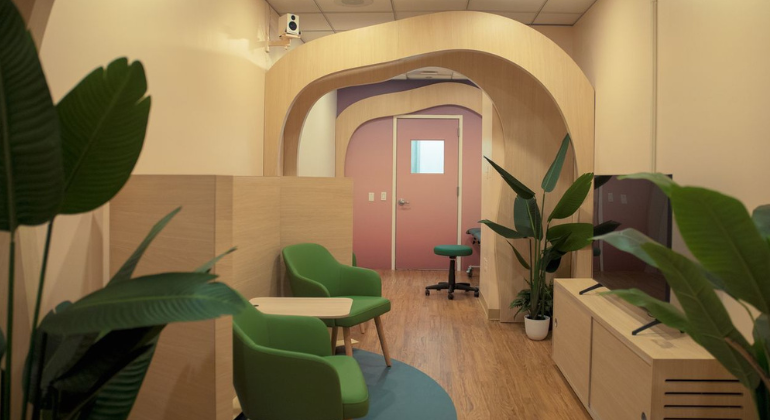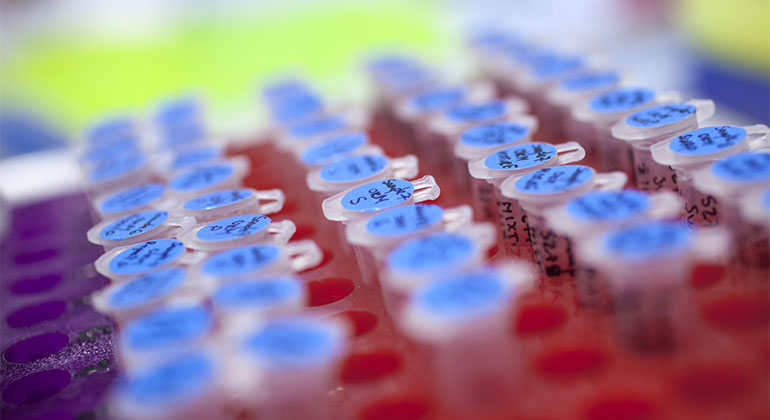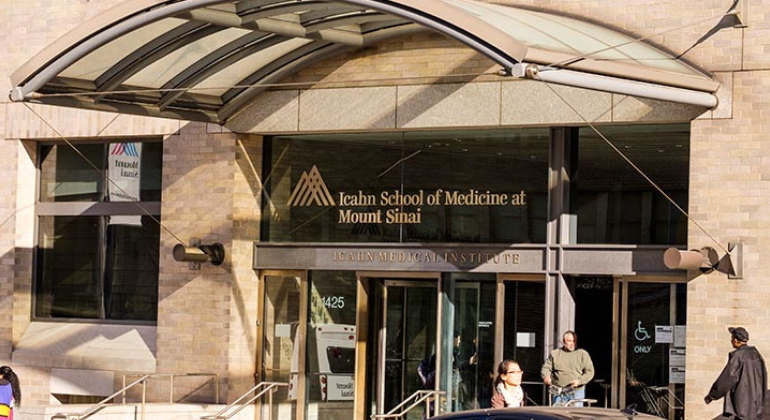Personalized Medicine Takes A Giant Step Forward At The Mount Sinai Medical Center
New ‘CLIPMERGE’ program helps physicians identify gene-drug interactions to improve treatment decisions.
Physicians and researchers at The Mount Sinai Medical Center will soon be utilizing a potentially revolutionary new data management and analysis platform that is external to, but communicates with, Mount Sinai's Epic Electronic Health Record (EHR). The platform, developed at Mount Sinai, gives doctors real-time therapeutic and diagnostic guidance based on their patient's genetic profile. Mount Sinai is pilot-testing the platform through a new research program called CLIPMERGE, which stands for CLinical Implementation of Personalized Medicine through Electronic health Records and Genomics, and is currently enrolling patients.
CLIPMERGE is described in an article to be published in the August issue of Clinical Pharmacology and Therapeutics. The article has been published online as an advance article preview, available at http://www.nature.com/clpt/journal/vaop/naam/pdf/clpt201372a.pdf.
The program is initially inviting 1,500 Mount Sinai patients, who are already enrolled in the BioMe™ "bio bank' to take part. Once a patient has consented to take part in CLIPMERGE, their DNA, derived from saliva, is analyzed for genetic variations that may affect how a drug works in that individual.
These variations are stored by the CLIPMERGE platform, and remain there silently, until that patient is prescribed a medication by their physician for whom CLIPMERGE has genomically-relevant information - such as it having a lower likelihood of being effective or there being a higher chance of side-effects due to that patient's particular type of genetic variation. When this happens, CLIPMERGE generates and sends a message, in real time, to the physician to let them know.
This process of providing relevant information to physicians at the point of care when they are treating patients is called "clinical decision support," and just as it sounds, is intended to support physicians in their clinical decision making. For example, CLIPMERGE will advise physicians if a patient's genetic profile indicates that he or she would be a "poor metabolizer" of a particular drug that they are prescribing. In that scenario, CLIPMERGE would display an alert on the physician's EHR screen, consisting of text describing the reason for the alert, some suggestions of alternative medications or doses that could be used, and a link to reference material so that physicians can read more about the science and evidence for pharmacogenomics.
The article gives an example of a patient whose genomic testing indicates he or she is a "poor metabolizer" of a prescribed drug, clopidogrel (Plavix ©). The CLIPMERGE alert that is displayed on the physician's screen states: "Poor metabolizer status is associated with significantly diminished antiplatelet response to clopidogrel and increased risk for adverse cardiovascular events following percutaneous coronary intervention." It then suggests the physician consider alternative medication.
"Our knowledge of pharmacogenomics, or genome-drug interactions, and how genetics can influence why some patients react better to some drugs than others, is growing rapidly and will likely transform how drugs are prescribed in the future," said lead author and the principal investigator of CLIPMERGE Omri Gottesman, MD, a physician- scientist at The Charles Bronfman Institute for Personalized Medicine at the Icahn School of Medicine at Mount Sinai. "What has been lacking to date is technology that can enable us to effectively implement pharmacogenomic information at the point of care and sufficient knowledge about how this information should be communicated to doctors. We hope that through CLIPMERGE, we can establish best practices both technological and human; and a robust process for clinical-decision support to deliver relevant genomic information to physicians at the moment they are caring for patients."
"Combining BioMe (the bio bank program at Mount Sinai) with CLIPMERGE has allowed us to attain real-time feedback on optimal therapeutics, based on a patient's DNA, for multiple conditions related to cardiovascular disease, blood clots, high cholesterol, depression and pain" said Erwin Bottinger, MD, the Irene and Dr. Arthur Fishberg Professor of Medicine, and Director of The Charles Bronfman Institute for Personalized Medicine at the Icahn School of Medicine at Mount Sinai. "This is an important step forward on the road to Personalized Medicine."
Beyond the 1,500 patients enrolled in the pilot project, Mount Sinai has enrolled a total of 25,000 patients in BioMe™. "Enrolling this number of patients is a significant achievement for Mount Sinai and combined with programs such as CLIPMERGE, is propelling us to the forefront of precision medicine and its application in the clinical setting," said Dennis S. Charney, MD, Anne and Joel Ehrenkranz Dean of Mount Sinai School of Medicine and Executive Vice President for Academic Affairs of The Mount Sinai Medical Center. "The future of medicine lies in genomics research and translating it to the bedside – and Mount Sinai's commitment to translational research makes us uniquely poised to lead that revolution."
The Mount Sinai BioMe™ Biobank, established in 2007 with a donation from the Andrea and Charles Bronfman Philanthropies, is now one of the largest repositories of its kind in the U.S. For more information, go to: http://icahn.mssm.edu/research/institutes/institute-for-personalized-medicine/innovation-and-technology/biome-platform.
About The Mount Sinai Medical Center
The Mount Sinai Medical Center encompasses both The Mount Sinai Hospital and Icahn School of Medicine at Mount Sinai. Established in 1968, the Icahn School of Medicine is one of the leading medical schools in the United States, and is noted for innovation in education, biomedical research, clinical care delivery, and local and global community service. It has more than 3,400 faculty in 32 departments and 14 research institutes, and ranks among the top 20 medical schools both in National Institutes of Health (NIH) funding and by U.S. News & World Report.
The Mount Sinai Hospital, founded in 1852, is a 1,171-bed tertiary- and quaternary-care teaching facility and one of the nation's oldest, largest and most-respected voluntary hospitals. In 2012, U.S. News & World Report ranked The Mount Sinai Hospital 14th on its elite Honor Roll of the nation's top hospitals based on reputation, safety, and other patient-care factors. Mount Sinai is one of 12 integrated academic medical centers whose medical school ranks among the top 20 in NIH funding and by U.S. News & World Report and whose hospital is on the U.S. News & World Report Honor Roll. Nearly 60,000 people were treated at Mount Sinai as inpatients last year, and approximately 560,000 outpatient visits took place.
For more information, visit http://www.mountsinai.org.
Find Mount Sinai on:
Facebook: http://www.facebook.com/mountsinainyc
Twitter @mountsinainyc
YouTube: http://www.youtube.com/mountsinainy
# # #
About the Mount Sinai Health System
Mount Sinai Health System is one of the largest academic medical systems in the New York metro area, with 48,000 employees working across seven hospitals, more than 400 outpatient practices, more than 600 research and clinical labs, a school of nursing, and a leading school of medicine and graduate education. Mount Sinai advances health for all people, everywhere, by taking on the most complex health care challenges of our time—discovering and applying new scientific learning and knowledge; developing safer, more effective treatments; educating the next generation of medical leaders and innovators; and supporting local communities by delivering high-quality care to all who need it.
Through the integration of its hospitals, labs, and schools, Mount Sinai offers comprehensive health care solutions from birth through geriatrics, leveraging innovative approaches such as artificial intelligence and informatics while keeping patients’ medical and emotional needs at the center of all treatment. The Health System includes approximately 9,000 primary and specialty care physicians and 10 free-standing joint-venture centers throughout the five boroughs of New York City, Westchester, Long Island, and Florida. Hospitals within the System are consistently ranked by Newsweek’s® “The World’s Best Smart Hospitals, Best in State Hospitals, World Best Hospitals and Best Specialty Hospitals” and by U.S. News & World Report's® “Best Hospitals” and “Best Children’s Hospitals.” The Mount Sinai Hospital is on the U.S. News & World Report® “Best Hospitals” Honor Roll for 2025-2026.
For more information, visit https://www.mountsinai.org or find Mount Sinai on Facebook, Instagram, LinkedIn, X, and YouTube.
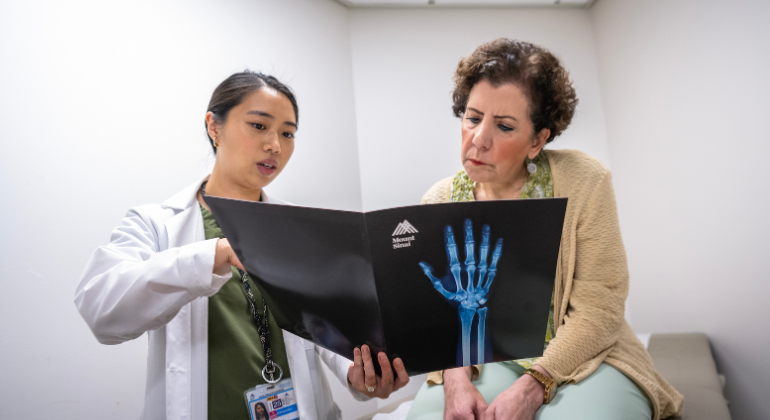
Mount Sinai Implements Own the Bone® Program for Fragility Fracture Patients
Jul 08, 2025 View All Press Releases
Mount Sinai Establishes Steven S. Elbaum Family Center for Caregiving
May 20, 2025 View All Press Releases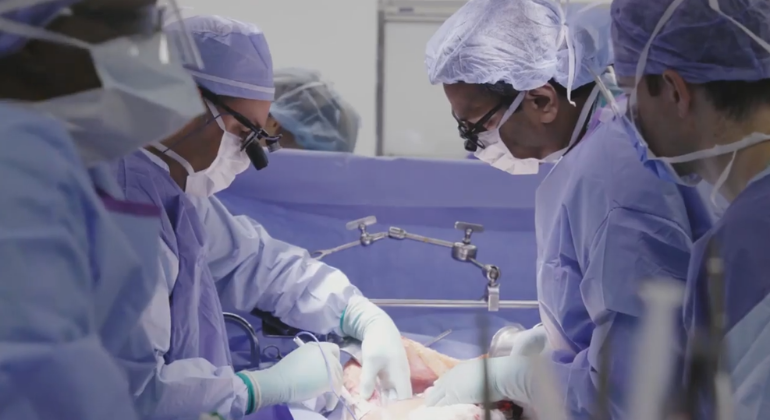
Mount Sinai Surgeons Perform First Heart-Liver-Kidney Transplants in New York State
May 20, 2025 View All Press Releases

